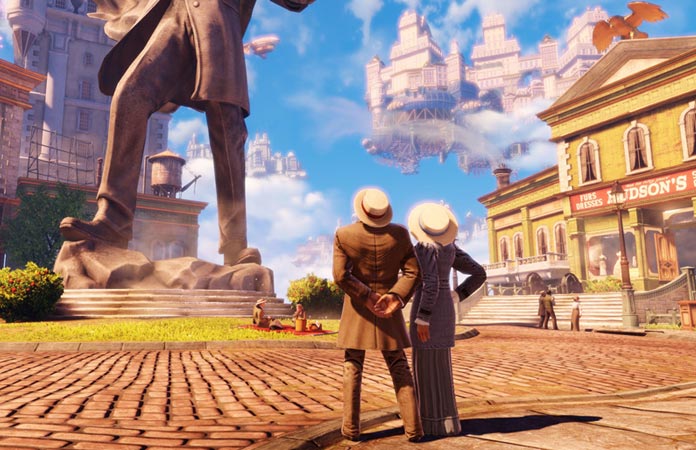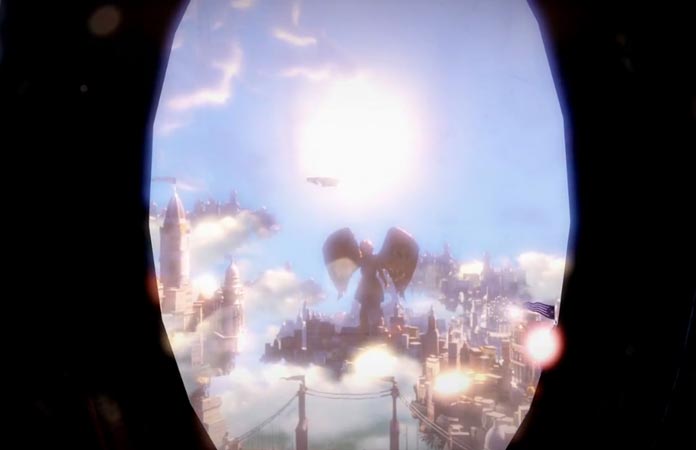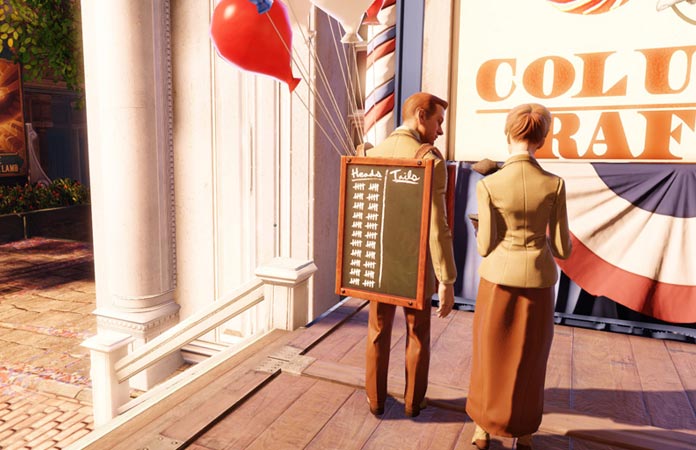Game Review: Bioshock Infinite
Published on April 1st, 2013 in: Current Faves, Game Reviews, Gaming, Reviews, Science Fiction |By Paul Casey

When Science Fiction reaches a large, mainstream audience it frequently stumbles. There are those out there, we are reminded until we expel body liquid, who are not particularly enamored with the idea of bizarre imaginings or Dystopian re-purposing of real events. These unreal things must be shrouded or hidden or compromised to meet the exacting standards of a public that drives Michael Bay pictures to earn hundreds of millions of dollars. They simply will not accept things that cannot happen, unless they get something tangible in return. “Gimme that walking arse shot or allusions to ear-fucking Megan Fox, whatever; just make sure that those grinning mugs don’t get their sense of reality altered! We’re running a business here. Don’t go abstract. Don’t make bold statements.”
When Irrational Games did Bioshock, it seemed to me, and some other folks, that here was a legitimate, big-budget step towards a new philosophy in video games. One that did not insist that the bare mechanics were the only thing worth evaluating. It made a powerful argument for world building, art direction, and quality writing and acting being able to do more than give finely tuned aiming and shooting a pretty wrapping. In Bioshock these things impacted the player’s experience to such a degree that evaluating one without the other seems foolish. That game had its issues, but its issues were a result of its ambition.
Bioshock Infinite is what happens when that ambition finds larger public, creative, and financial support. There is a storytelling depth here that very few games have approached. More importantly, it is a braver and more challenging piece of work than any of the other narrative successes in recent years. Its politics are not easily identifiable—though I am sure there are some lining up to suggest it fails because it contradicts some ideology or other—and its examination of human flaws leads the player to bad, honest places. If there is any clear message to be taken, it is probably that people who seek power are invariably the people who should not possess it, regardless of how righteous they appear.
Bioshock Infinite‘s influences are many, but a particular nod goes to Lost, not only in the way certain Science Fiction elements are handled, but also its fixation on personal redemption. And like Lost there are times when it may seem like Ken Levine and his team are coming down on one side of the religious argument. Ultimately, though, it’s about the individuals involved, and problems that exist independently of any given dogma.
Combat is brutally violent. It makes you desperate. It overwhelms you, particularly on Hard and the obscenely difficult 1999 mode. Then it gives you a skyline and a few airships and you are liberated. There are few joys that are equivalent with the movement, speed, and imagination present in these set pieces. Combat feeds back into the story in a powerful way, utilizing the unimaginable slaughter of hundreds of people, rather than playing it off as an unavoidable video game standard. At its conclusion it feels, in spite of the game’s harsh levels of violence, that there may be a very clever argument here against violence as a means of solution.

WHAT IS COLUMBIA, IF NOT ANOTHER ARK FOR ANOTHER TIME?
A major way in which Infinite has progressed from Bioshock is that it has removed that game’s moral choice system. There is no tally, and there are no real rewards/punishments for choices. Perhaps the most shocking part in the game is when you realize that you can murder random innocents. You reach Soldier’s Field, a magical boardwalk of happy families and children. It is nighttime and the lights move you, as you walk with Elizabeth to watch a carousel or look through a bookshop. Two mothers discuss their fears for their children and the future. One asks the other to simply let the children enjoy themselves. There will be plenty of time for worry later.
You can, if you are so inclined, walk up to these women and shoot them in the head. You can murder the people enjoying their ice cream. You can murder couples on benches. This is where the differences between Rapture and Columbia become most apparent. Most of the people you encounter are not guilty of any great crime, or a threat to your progress. They’re just trying to live their lives. Columbia is so meticulously realized, and so visually inspiring, that harming it in such a way leaves you unusually moved. The game is full of moments like these; they never force you to care for some dismal resource-management reason, but because of your attachment to Columbia and its people.
The opening scenes are surely as powerful as Rapture’s initial reveal. The music as the clouds part and Columbia comes into view is magical. Garry Schyman has done a hell of a job. The use of “Will the Circle Be Unbroken?” at key moments through the game ensures that the words and melody will be with you for a long time. There are also some deliciously anachronistic songs that pop up, giving an amusing insight into the society of Columbia.
When things go bad—and they go very, very bad—it feels like a personal failure in a way which it could not with Rapture. Sure, there is misery and darkness here behind the sunny exterior. It is still, though, a work of startling beauty, and it is hard to consider that there is not some way to salvage it and the many good people who have raised their families in the skies. Every building deserves a gawp. Every voxophone demands a listen. Every gorgeous piece of propaganda encourages an unsettled tingle up the spine.

BRING US THE GIRL AND WIPE AWAY THE DEBT.
A reason why the player becomes so fiercely attached to Columbia is Elizabeth. Much has been written about her in the run up to the game’s release. It is not sufficient to describe her in terms of how she decides which objects interests her, or to say how she affects combat through her ability to “tear” the environment and bring in different resources. She is a superbly written and conceived creation, and her development is one of the most rewarding surprises of Infinite. Courtnee Draper’s vocal performance stands out in a game full of top talent. Her love of life and joy at simple things brings a smile. Her ability to project immense power and fear simultaneously gives you a handle on the thin line the character walks.
Troy Baker—a very successful and popular voice over guy—shifts from amusement to confusion and then anger as Booker DeWitt. He does it with the smoothness of a pro, and when things get very odd, he vocalizes the player’s feelings with just the right tone. Elizabeth’s journey from isolation, to insatiable curiosity of the world around her, and then to a full understanding of her own nature is what gives every one of Booker’s actions a purpose.
Elizabeth’s existence prior to yours and Booker’s arrival is displayed for you with obsessive detail. Her indirect interaction with the rather clever Lutece sorts is brilliant Science Fiction, and the work of Jennifer Hale as the female of the pair deserves a note for its cynical, unimpressed attitude towards extremely unusual events.
The situation gets grim, but it is never about rescuing Elizabeth in that standard fashion. It is not achievement you are after, but an attempt to live up to your end of the bargain. She has been your partner and your friend for the many hours of your journey together. The connection between you and Elizabeth is more compelling than any virtual relationship offered in a video game. It pushes you forward in a way that I have never felt before.

IT WOULD SEEM THE UNIVERSE DOES NOT LIKE ITS PEAS MIXED WITH ITS PORRIDGE.
One can’t help but contrast the story of Bioshock Infinite and its fearless conclusion with Bioware who begged forgiveness from enraged petition makers for the ending of Mass Effect 3. As with the twist in the first Bioshock, Infinite presents turns of the kind prone to misinterpretation. If the ending is only unpacked literally, then one misses the most poignant things Irrational Games have to say about human fallibility and all-consuming remorse. This is not a cheap shock, but a considered and philosophical eye on whether there are some things so terrible that they can never be forgiven or undone. It is far more abstract than anything I have seen in a big budget title, and undercuts so many of the assumptions about what gamers want that it made me have a little moment of face crying and inside cheering. It is also absolutely right for the world and the characters.
Bioshock Infinite is, in a way, education by subterfuge. Combat is raucous and violent. It was marketed in part to draw in that Call of Duty crowd and the big dollaroos that they bring with them. Give them their cover with the grisly shotgun-wielding fellow and let them think that they’re getting something that affirms their worldview. Let them think that Elizabeth is just another vacuous prize to claim. Let them think that victory will come with the death of their enemies. Until they play it.
As with Bioshock, there may still exist the philosophical divide. There are those who think the topics Irrational are exploring here are not worthy of attention. Doubtless, there are those who hold a prejudice against the Science Fiction elements it contains and the seeming nonsense that such things suggest.
Bioshock Infinite, though, makes it extremely difficult to maintain such a viewpoint. It is assured, highly intelligent, and so full of emotional wallop that it shames most every other video game which tries and fails to elicit a tear or two. If any game is capable of not only being tolerated by an audience out of step with its ideas, but altering that audience, it is this one. Irrational Games have created a game that has a good shot at defining an entire generation.
Time limit is exhausted. Please reload the CAPTCHA.